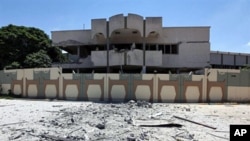NATO bombs hit government buildings in the Libyan capital Tripoli Thursday the same day NATO's secretary general visited Washington. A Libyan resistance leader, also visiting the U.S. capital, says the opposition needs more bombs, more often, to win the war against Moammar Gadhafi.
The warplanes struck early morning, attacking Libyan leader Moammar Gadhafi's compound in Tripoli. Libyan authorities took international journalists on a tour of the damage. and on a tour to a hospital where authorities said victims were being treated. Meanwhile in Washington, NATO Secretary General Anders Fogh Rasmussen explained the alliance's mission in Libya, and its changing role in the world. "While NATO's past and present speak for themselves, the alliance future is not yet written," he said.
In the Mideast, NATO faces seismic change. Its no-fly zone over Libya started in March. The compound struck on Thursday has been hit several times.
The explosions awakened a man who spoke to VOA via Skype. He describes himself as the leader of a peaceful civil disobedience group. He normally works in Britain, but has returned to his hometown of Tripoli. He says NATO airstrikes boost morale in the Libyan capital. VOA asked him what he would say to the NATO leader if given the chance.
"Why the hesitation? With each hesitation, Gadhafi forces are able to fire more rockets at civilian areas. With each extended decision making process, more civilians are hurt and injured and massacred," the man said.
And, so we asked Secretary General Rasmussen about NATO's strategy. "There is no hesitation whatsoever. Right from the outset, when we took command six weeks ago, we have kept a very high operational tempo. Six weeks and 6,000 sorties," he said.
A leader within the Libyan opposition is also in Washington and met Thursday with U.S. legislators. Waheed Burshan says NATO is not consistent enough in the airstrikes.
"NATO -- they tried to be very surgical about this, but I think they are losing certain momentum in this battlefield," Burshan said.
This week opposition forces overtook the Misrata airport, seizing government weapons after days of fighting. Rasmussen says NATO has no plans to take advantage of the victory. "I do not envision the use of airports on Libyan soil."
Rasmussen says NATO's 150,000 forces worldwide serve NATO's mission. He says the alliance is not only responding to change, it is also shaping change. Yet in Libya, some say that change is not coming fast enough.




